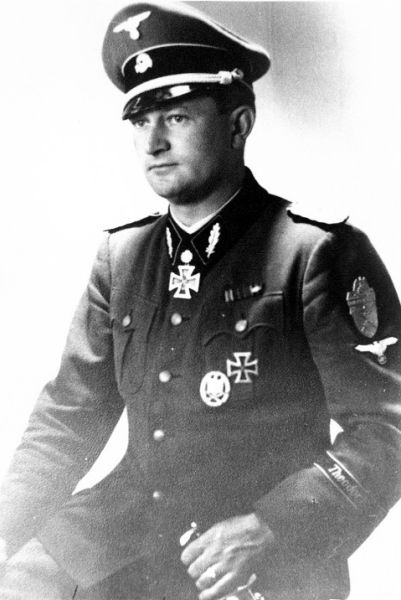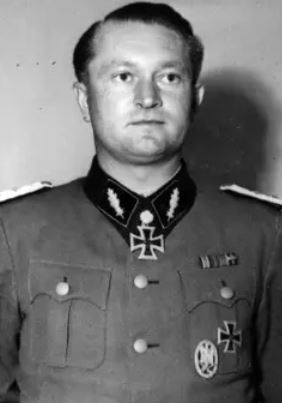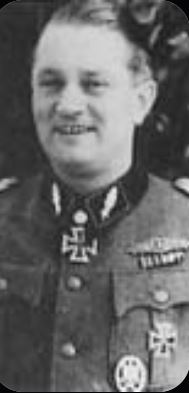Ullrich, Karl Adolf (Waffen SS)
- Date of birth:
- December 1st, 1910 (Saargemünd/Sarreguemines, Alsace-Lorraine, Germany)
- Date of death:
- May 8th, 1996 (Bad Reichenhall/Bavaria, Germany)
- Service number:
- SS-Nr.: 31.438 // NSDAP-Nr.: 715.727
- Nationality:
- German
Biography
Promotions:
30.01.1934: SS-Scharführer
01.10.1934: SS-Oberscharführer
01.02.1936: SS-Standartenoberjunker
20.04.1936: SS-Untersturmführer
01.09.1937: SS-Obersturmführer
01.11.1938: SS-Hauptsturmführer
01.11.1941: SS-Sturmbannführer
00.11.1943: SS-Obersturmbannführer
29.07.1944: SS-Standartenführer - RDA 13.07.1944
20.04.1945: SS-Oberführer - RDA 09.10.1944
Career:
00.00.1931: joined the NSDAP
00.04.1932: joined the SS in the 3. Sturm, II. Sturmbann, 56. SS-Standarte, Bamberg
00.06.1933-00.09.1933: Lehrgang, Infanterie-Regiment 9, Reichswehr
00.09.1933-00.06.1934: Landespolizei
00.07.1934: Unterführer, 3. Sturm, SS-Standarte 1, SS-VT
00.03.1935-00.02.1936: SS-Oscha, SS-Junker, SS-Junkerschule Braunschweig
00.02.1936: SS-Standartenoberjunker, Zugführer 3. Sturm, SS-Pionier-Sturmbann, SS-VT, Dresden
01.09.1937: SS-Ostuf, Chef, 3. Sturm, SS-Pionier-Sturmbann, SS-VT, Dresden
01.09.1939: SS-Hstuf, Chef, 3. Sturm, SS-Pionier-Sturmbann, SS-VT - campaign in Poland
00.05.1940: SS-Hstuf, Chef, 3. Sturm, SS-Pionier-Sturmbann, SS-VT - campaign in France
00.02.1941-00.05.1941: SS-Hstuf, Stab, SS-Pionier-Bataillon, SS-VT
00.06.1941-00.06.1942: SS-Hstuf, Chef, SS-Panzer-Pionier-Batallion 3, SS-Division 'Totenkopf'
00.02.1942: SS-Stubaf, distinguished himself during the fightings in the Demjansk Pocket
02.07.1942-18.03.1943: SS-Stubaf, SS-Korps-Pionierführer, II. SS-Panzer-Korps - Kharkov
18.03.1943: SS-Stubaf, Führer, III. Bataillon, SS-Panzergrenadier-Regiment 5 'Thule', 3. SS-Panzergrenadier-Division 'Totenkopf' - Kharkov-Bjelgorod - Operation Zitadelle
09.11.1943: SS-Ostubaf, Führer, SS-Panzergrenadier-Regiment 6 'Theodor Eicke', 3. SS-Panzergrenadier-Division 'Totenkopf'
20.06.1944-13.07.1944: SS-Ostubaf, Führer, 3. SS-Panzergrenadier-Division 'Totenkopf'
13.07.1944: SS-Staf, Kdr, SS-Panzergrenadier-Regiment 6 'Theodor Eicke', 3. SS-Panzergrenadier-Division 'Totenkopf'
09.10.1944: SS-Ofu, Führer, 5. SS-Panzer-Division 'Wiking' - Operation „Frühlingserwachen"
12.05.1945: captured by the US troops - US POW
00.09.1948: released
00.00.1984: auhtor of the book "Wie ein Fels in der Brandung"
Do you have more information about this person? Inform us!
- Period:
- Second World War (1939-1945)
- Rank:
- SS-Hauptsturmführer (Captain)
- Unit:
- Chef, 3. Kompanie, SS-Pionier-Sturmbann, SS-Verfügungs-Division
- Awarded on:
- May 18th, 1940
- Period:
- Second World War (1939-1945)
- Rank:
- SS-Hauptsturmführer (Captain)
- Unit:
- Chef, 3. Kompanie, SS-Pionier-Sturmbann, SS-Verfügungs-Division
- Awarded on:
- July 1st, 1940
- Period:
- Second World War (1939-1945)
- Awarded on:
- 1941
- Period:
- Second World War (1939-1945)
- Rank:
- SS-Sturmbannführer (Major)
- Unit:
- Kommandeur, SS-Pionier-Bataillon, SS-Division “Totenkopf”, X. Armee-Korps, 16. Armee, Heeresgruppe Nord
- Awarded on:
- February 19th, 1942
"SS-Sturmbannführer Ulirich (commander of Kampfgruppe Kobylkina) and his weak assortment of formations have fought for over two weeks at a decisive position against a far numerically superior enemy.
In this time he conducted himself with exemplary bravery, and although his Kampfgruppe was repeatedly encircled he has so far repulsed all attacks (even those supported by heavy tanks) whilst inflicting heavy losses in men and materiel on the enemy.”
- Period:
- Second World War (1939-1945)
- Awarded on:
- 1942
- Period:
- Second World War (1939-1945)
- Awarded on:
- 1943
- Period:
- Second World War (1939-1945)
- Awarded on:
- 1943
- Period:
- Second World War (1939-1945)
- Rank:
- SS-Obersturmbannführer (Lieutenant-colonel)
- Unit:
- Kommandeur, SS-Panzergrenadier-Regiment 6 “Theodor Eicke”, 3. SS-Panzer-Division “Totenkopf”, Heeresgruppe Südukraine
- Awarded on:
- May 14th, 1944
“1.) On the 19.03.1943 SS-Regiment ’Totenkopf’ had the mission of attacking out of the Murow area in order to reach the Donez along both sides of Iwanowka and block the crossings over the river. However the enemy offered determined resistance from well constructed positions, and so the attack was unable to make progress.
In this situation SS-Obersturmbannführer Ullrich (commander of III./SS-Regiment ‘Totenkopf’ at the time) distinguished himself through exemplary personal bravery. He was continuously present amongst the foremost elements of his Bataillon, and from here he was among the first to enter into the Bolshevik positions. He then continued to press the attack with relentless energy, and by doing so his men found the resolve to also achieve their utmost. His personal devotion to duty here led to the capture of the villages and river crossings at the villages of Orguzewo, Botkino and Iwanowka in the early afternoon of the 19.03.1943.
This successful attack blocked the retreat route of strong Russian forces that were still located west of the Donez, and with this the conditions were set for their eventual destruction in the subsequent combat.
2.) On the 10.07.1943 the Division commenced an attack that had the intent of creating a bridgehead across the Psel river. For their part the Bolsheviks hammered our attacking elements with powerful artillery and mortar fire from their well-constructed and dominating positions, with the result that our attack stalled.
Although his unit had sustained heavy losses, SS-Obersturmbannführer Ullrich was able to reenergize his Bataillon through his exemplary personal bravery. Thus, by 19:00, he had captured the village of Krassnyj-Oktjabr and created a small bridgehead over the Psel. After this the enemy struck back with powerful infantry and armoured forces, however SS-Obersturmbannführer Ullrich and his weak forces were able to withstand their onslaught for a whole week. SS-Obersturmbannführer Ullrich was the soul of the resistance in this sector throughout the days and nights of heavy hostile artillery fire. Wherever the enemy succeeded in achieving a penetration with their great superiority in numbers they were always thrown back in counterthrusts that SS-Obersturmbannführer Ullrich launched with the last men at his disposal.
This outstanding performance by SS-Obersturmbannführer Ullrich laid the groundwork for the continued successful advance in the direction of Kursk. On the 17.07.1943 the bridgehead was evacuated in accordance with the orders from high command.
3.) In the early morning hours of the 14.11.1943 the Bolsheviks succeeded in penetrating the lines of one of our Infanterie-Divisionen. In response SS-Obersturmbannführer Ullrich and his Pz.Gren.Rgt. ’Theodor Eicke’ were sent to the sector, and although the enemy had much greater numbers of men and materiel they were pushed back from their newly-conquered ground in a bold counterattack. They then attempted to reverse this outcome by launching several counterthrusts on the same day, but all of these were defeated.
Thus the Bolsheviks brought up fresh reinforcements, and they resumed their attack on the 15.11.1943 with the support of a powerful preparatory barrage, rolling aerial attacks and 48 tanks. The original frontline was held successfully in the sector of the Regiment’s II. Bataillon, however despite offering extremely brave and self-sacrificing resistance III. Bataillon was pushed back to the eastern edge of Bairsk. In this critical situation SS-Obersturmbannführer Ullrich rallied his last remaining reserves, launched a bold counterthrust and managed to bring relief to his hard-pressed III. Bataillon. By the evening of the 15.11.1943 the old frontline was firmly in friendly hands.
The exceptional devotion to duty and flexible leadership that SS-Obersturmbannführer Ullrich demonstrated here prevented a Bolshevik breakthrough in the direction of Krivoi Rog.
4.) The combat elements of Regiment ‘Eicke’ (with II. Bataillon being transferred via air and III. Bataillon plus the remaining regimental elements being sent via railroad) were transferred to the Balta area. From here it arrived at its combat zone via a foot march in the most difficult of weather conditions. Once it was ready for battle the Regiment then smashed an enemy bridgehead at Ologopol that was in the process of forming, after which it created a bridgehead of its own across the Ssawrankabach at Tschetschelnik. In the days that followed the Regiment was involved in fierce defensive combat, and in this time the regimental commander repeatedly buttressed the will to resist of his men through his own brave actions at the decisive points of battle.
The enemy achieved a penetration in the sector of the right neighbouring unit on the 19.03.1944. This, coupled with hostile thrusts southward in the direction of Ljubomirka and westward in the direction of the Olgopol—Ssawranka river road, constituted a grave danger for the Regiment. Thanks to the initiative of the regimental commander the enemy force (consisting of about 600-800 men) was initially brought to a halt by a friendly replacement unit along the western edge of Ljubomirka and east of the road.
Our forces then launched a deliberate counterattack on the 20.03.1944, one which was to be conducted in 2 directions at first before the two groups linked up and then continued advancing northwards. During this attack SS-Obersturmbannführer Ullrich personally participated in the thick of the action, and he especially distinguished himself through his prudent leadership and personal bravery. Thanks to this the enemy penetration was eliminated, and this permitted the realization of the following outcomes:
a) The continued retention of the frontline along the Ssawranka river.
b) The smooth conduct of the withdrawal movement that was later carried out in light of the general situation.
SS-Obersturmbannführer Ullrich is an especially brave SS officer who has been on the field of battle since the first days of the conflict and outstandingly distinguished himself in every theatre of war. His tireless devotion to duty, superior leadership and personal conduct has forged him into an officer that can react appropriately to any situation.
In light of his exceptional bravery and the great successes it has generated, I ask that SS-Obersturmbannführer Ullrich be awarded the Oakleaves to the Knight’s Cross of the Iron Cross.”
480th Award.
Sources
- Photo 1: Willi Schumacher Collection
- Photo 2:
- Photo 3:
- - MOONEY, PETER, Waffen-SS Knights and their Battles, Schiffer Pub Ltd, 2008.
- MOONEY, PETER, Waffen-SS Knights and their Battles, Schiffer Military History, 2016.
- Schneider J.W., Their Honor was Loyalty!, R. James Bender Publishing, 1977
- Fellgiebel, Walther-Peer, Elite of the Third Reich - The Recipients of the Knight's Cross of the Iron Cross 1939-45: A Reference, Helion & Company Limited, England, 2003
- Krätschmer, E.G., Die Ritterkreuzträger der Waffen-SS, Nation Europa Verlag GmbH, Coburg, Deutschland, 1999
- Yerger, Mark C., Waffen-SS Commanders – The Army, Corps and Divisional Leaders of a Legend; Krüger to Zimmermann, Schiffer Publishing Ltd., USA, 1999
- Axis History Biographical Research via Axis History Forum
- Microfilm Publication A3343. US National Archives




















